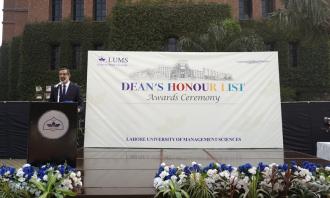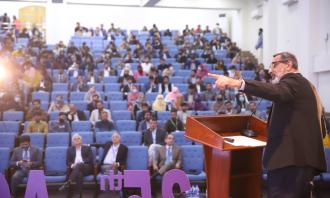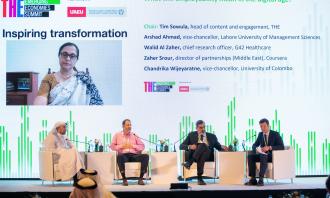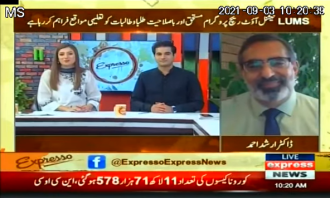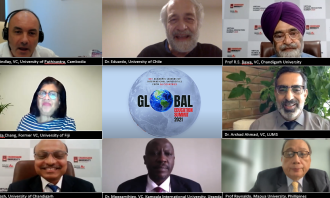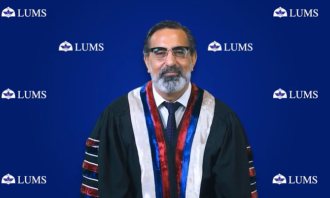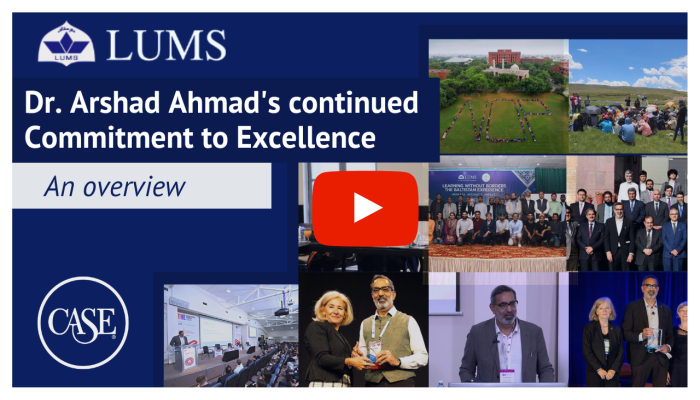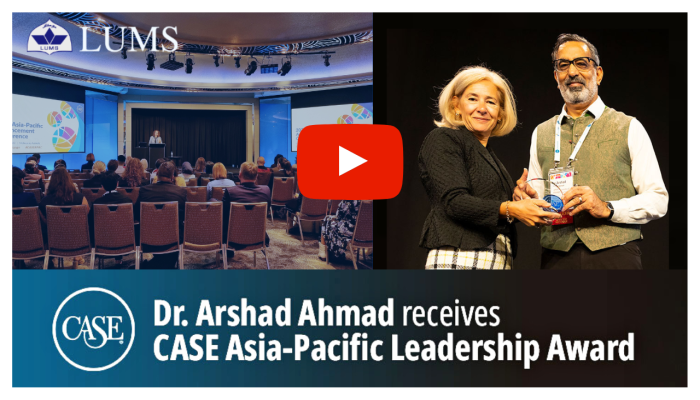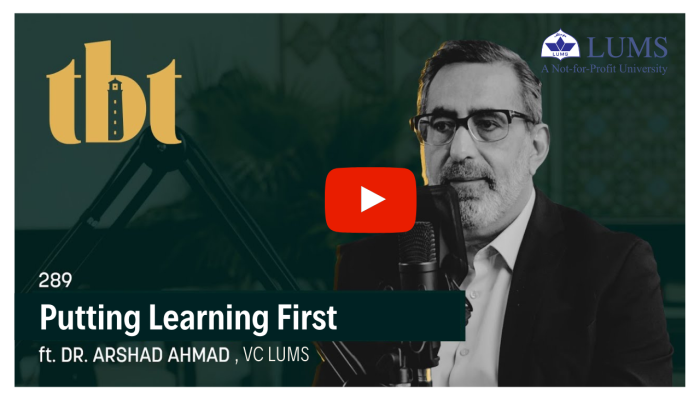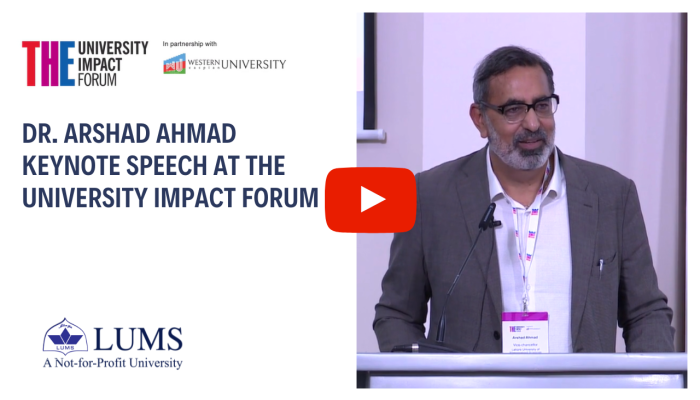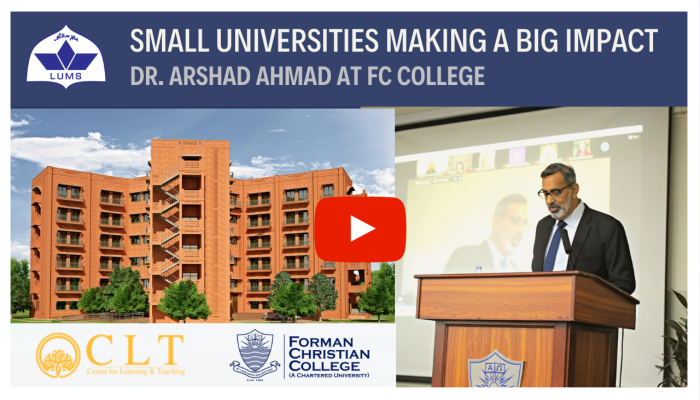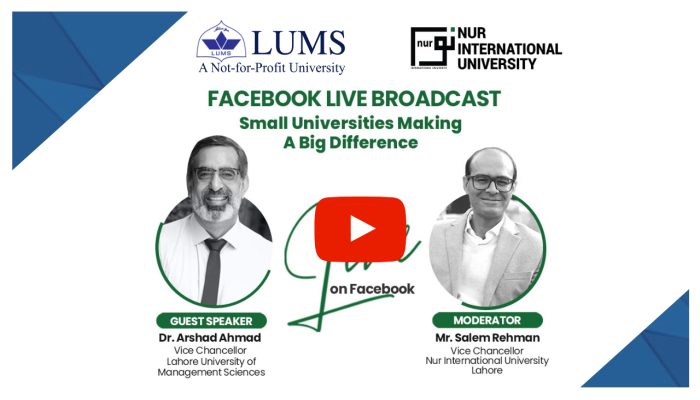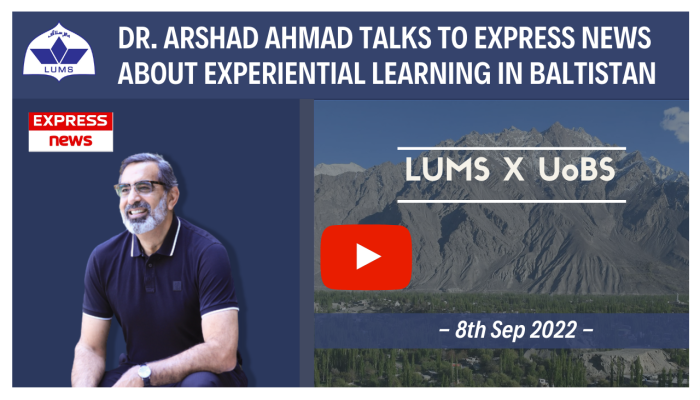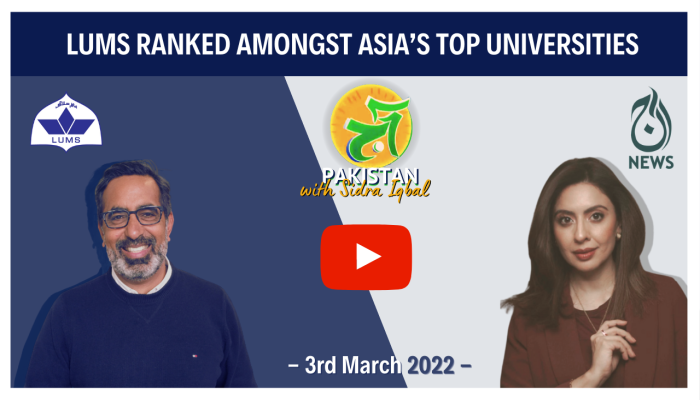Talks and Interviews
Keep up-to-date with Vice Chancellor Dr. Ali Cheema by reading his speeches and watching his latest interviews.
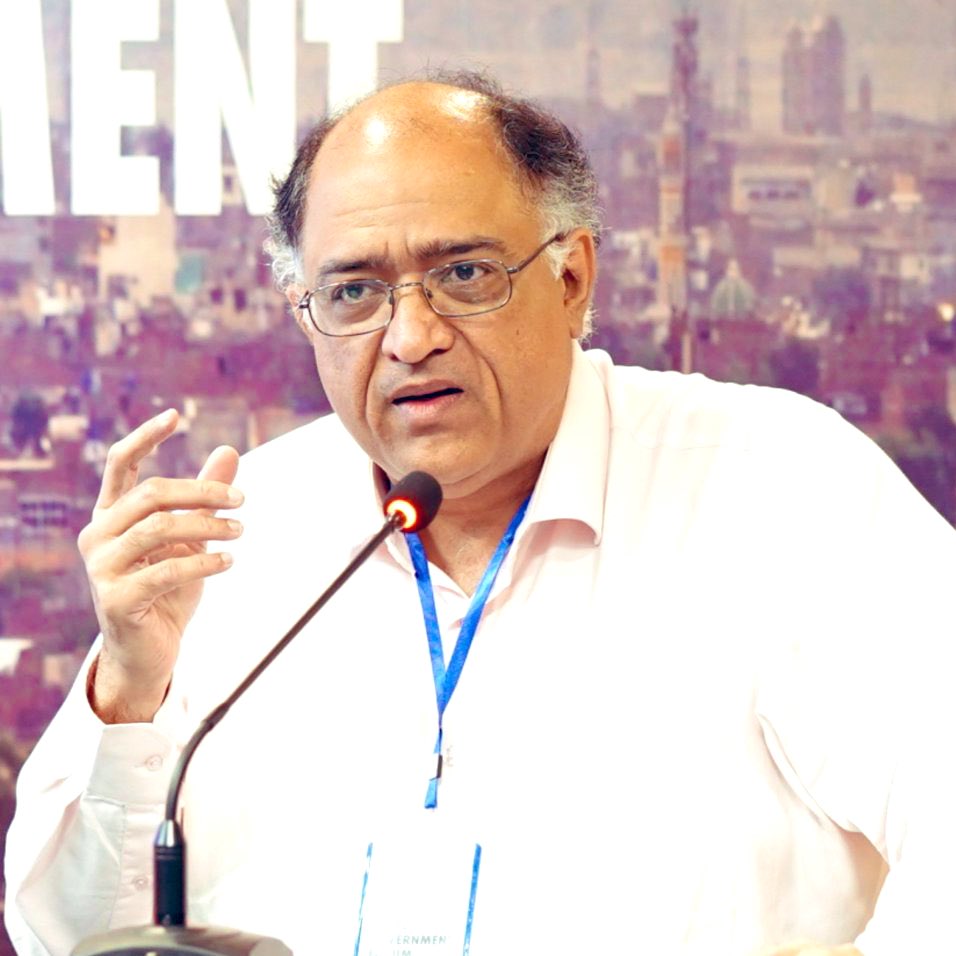
- SSE Dean's Honor List CeremonyDecember 3, 2021SSE Dean's Honor List Ceremony
Syed Babar Ali Sb, provosts Dr. Farhat and Dr. Jadoon, Dean Sabieh, faculty members, dear parents, and our meritorious students, Assalaam o Alaikum.
I want to thank parents and family members without whom we would not be here today. Parents give the gift of education to children. And children must pass the gift of learning to others. This virtuous cycle represents our shared hope of developing our nation and a better world.
To our students, congratulations for earning this important distinction of being on the Deans Honor List. Congratulations on your hard work and perseverance through the pandemic. You never gave up and never looked back.
Abdullah Khan personifies your exceptional achievements. He comes from a local school in the district of Tando Allahyar, in Sindh. Abdullah’s school years are a result of several scholarships. At LUMS, Abdullah has been on the dean’s list each year for the past 4 years and he will graduate with a full 4.0 GPA. Abdullah honor’s his late grandfather for his many accomplishments.
Dear Students, on behalf of your teachers we take pride in your academic abilities. We also look to you to make greater contributions. This is because with success comes responsibility, and the greatest responsibility you have is to help others to become better than you.
By instilling the gift of learning to others you become a multiplier for progress. We are counting on you. Pakistan is counting on you. I wish you all of the success and hope you stay closely connected with us for the years to come.
Congratulations again!
Thank you
- Speech at Government College UniversityNovember 26, 2021Speech at Government College University
VC Asghar Zaidi Sb, students and colleagues, ASW. Thank you for inviting me to this very impressive program. I join my colleagues from LUMS who have participated in the conference to applaud GCU and its collaborators in hosting us and putting students first. For the little time I have with you, I would like to speak about students as essential partners in the academic enterprise.
Before I do so, let me go back a little to the 90’s when all of us were being introduced to www – the world wide web, which marked the beginning of platforms and the huge impact they were going to have on our lives.
In these first days of the online era, the famous Bill Gates answered a question about why Microsoft didn’t have an internet division. His answer was, “The reason Microsoft doesn’t have an internet division is the same reason General Electric doesn’t have an electricity division.”
The point Gates was making was that the internet needed to be part of everything Microsoft did, so he wasn’t comfortable putting it in a silo of its own.
I believe that students are the electricity that drives the institution. Without you, we are out of work. But without us, you are on your own.
So, our work is enriched by meaningful engagement between students, staff and faculty. And that engagement implies we should better understand what each of us means by a meaningful partnerships.
So what are examples of these meaningful partnerships?
Well, there are at least three broad areas where students can successfully partner with faculty and staff. One area is governance, the second is in research and teaching and the third is co-curricular. There are other areas but let me cover these briefly with examples.
Re. governance, at LUMS some 30 students are elected to form a Student Council which appoints their executive. This year the students chose Anoosh Fatima Khan and Sana Chaudry as our first female president and vice president. Gender matters. We must give equal opportunity and support aspiring female leaders at every opportunity. The Council works very closely with the Office of Student Affairs and the Dean of Student Affairs who is proposing that the Council executive be given full time paid jobs so they can achieve their mandates and goals to improve the student experience. This is a great idea that I fully support.
Now LUMS has 5 Schools (SDSB, HSS, SSE, SAHSOL and SOE) each of which have School Councils where students have seats with voting power. This means students have a say in the business of each School.
Student Council members also have a voice in the Steering Committee that guides the overarching University Council where they participate in determining academic and administrative issues. Also, we have student members on university committees including the Disciplinary committee where students have set high standards for the code of conduct and these are to be applauded.
The second area that is perhaps the most promising are partnerships in research, teaching and learning. Here, you might see the familiar teaching or research assistants and other internships in labs. To take this further, we have a formal pedagogical partnership program where students apply to work with faculty to co-design courses together, co-author research papers together, co-present work in conferences, and co-work on high-impact community projects. In these partnerships, students are paid to work 4-6 hours a week and often find the real rewards are being treated like adults and mentorship opportunities as they apprentice in scholarship related activities.
Finally, co-curricular activities provide so many opportunities for students to learn specific skills by joining any of the 50 plus student societies. Here we have a wide spectrum of Student Societies ranging from debating, chess, music, adventure, sports, and the list goes on. Students self-govern and are responsible for their Societies.
In addition, students have a chance to become co-workers in the ecosystem of a residential campus. For example, students from our School of Education are responsible to operate one of the largest campus day-care facilities in Pakistan that take care of young children while parents are at work. They co-operate and work at the LUMS Store and two campus restaurants at the Khoka and the Acquatic centre.
I hope this give you a sense of partnership work at LUMS. I hope we can learn from the wonderful ideas of this conference and the student leadership at GCU.
But not all partnerships work. Many partnerships fail in the business world as they do elsewhere. The ones that succeed, have a few things in common. These are the values that are the glue that bind partnerships. Values of respect, reciprocity, and responsibility. These values are more important than the explicit goal of the partnership. So we have to ask ourselves as faculty what it means to really respect students in terms of nurturing their talents and understand where they are coming from. In my experience the most difficult value in practical terms is responsibility, because it involves sharing power.
We in senior administration are absolutely convinced that we must continue to scale up the responsibilities part to arrive at the point where
Partnership programs are infused – like electricity – through all of our activities, our structures and our plans.
Thank you
- Keynote speech at PIDE 35th Annual MeetingNovember 23, 2021Keynote speech at PIDE 35th Annual Meeting
“None of the challenges and issues we confront in society, including the pandemic, can be solved from a single disciplinary lens,” stated Vice Chancellor, LUMS, Dr. Arshad Ahmad. Speaking at the 35th Pakistan Society of Development Economists Annual Conference, he gave a detailed presentation on the underlying structures and systems needed to view these challenges from a transdisciplinary perspective.
He explained, “Most educational institutions use traditional approaches focused on fragmented, discipline-focused knowledge to address issues. Most interventions to counter these have barely made a difference. At LUMS, we are convinced that these grand challenges require solutions that encompass multiple expertise from across disciplines or what we can refer to as holistic approaches. Transdisciplinary approaches are the highest level of disciplinary interaction.”
To achieve this, LUMS has multiple centres that are focusing on energy, water and agriculture, urban planning, gender, technology and entrepreneurship, he explained. “Here multiple research paradigms meet at least three conditions for transdisciplinarity. First, centres must be led by faculty who ensure cross-appointments that reflect diverse expertise; second, university policies must clearly develop career progression pathways at centres that can be systematically evaluated and third, programming needs to prepare students for 21st-century learning.”
Dr. Ahmad also discussed another intervention at LUMS in which first-year students coming from affluent, urban areas experience the difficult situations disadvantaged students face which can lead to a change in their world views. “Recently, the University of Baltistan, a nascent institution nestled in the Skardu Valley approached us for an institutional collaboration. To plan the intervention, our team spent a week in the valley. We committed to a twinning programme that will have 150 LUMS students paired with an equal number of students from the University of Baltistan who will be co-taught with faculty from both institutions in Skardu next July. Similar faculty exchanges for research collaborations are underway.”
He also shared how the trip was the backdrop to focus on collaboration on climate change, research possibilities and courses on water management and green energy.
To view Dr. Ahmad’s address, click here.
- Electric Vehicle Report Launch 2021November 10, 2021Electric Vehicle Report Launch 2021
Counsel General William Makaneole, Head of Energy, Jenna Diallo, Pro chancellor Syed Babar Ali Sb, Rector Shahid Hussain Sb, trustees, special guests, colleagues,
ASW, Good morning, Aloha and a warm welcome to LUMS!I had chance to have a sneak preview of the EV Report and as you will see, we are in for a treat. Congratulations to Dr. Naveed Arshad and his team for their significant contributions. And Mahalo – our heartfelt thanks, to USAID, who have been our partners since LUMS began its operations 35 years ago.
Back in 1986 it was USAID who stepped up to fund our landmark Academic Block on the condition we would raise an equivalent amount, which our founders did. The Academic Block continues to be the heartbeat of LUMS, hosting our largest School of Humanities and Social Sciences as well as the Offices of Student Affairs and International Affairs, The Mahbub ul Haque Policy Center, The Saida Waheed Gender Center and the LUMS Learning Institute – the first of its kind in the country.
Over the years, USAID’s unwavering support includes Merit and Needs-based Scholarship Programs in collaboration with HEC, which has also had a transformational impact on our students.
From humble beginnings of a business school that is now AACSB accredited, over the years we have added 4 other schools and a dozen research centres. All of this is marked by a relentless drive for excellence, allowing LUMS to be included as the 40th ‘World’s Best Small Universities’ ranked by Times Higher Education.
USAID have been hand in hand with us throughout this journey, and their contribution to LUMS continues as we launch this significant report.
Ladies and gentlemen, today, with the rest of the world, we want to leave the pandemic behind. We want to leave the challenges it imposed on us, behind.
However, one lesson from Covid is clear. The lesson is that solutions must come through collaboration and through interdisciplinary expertise.This is what our colleagues are doing in this School of Science and Engineering and going further to collaborate with expertise from the Business school, our Law School as well as from our colleagues in the Humanities and Social Sciences.
This report is also an example of how LUMS is tackling some of Pakistan’s grand challenges – including climate change, water management, entrepreneurship, which you will hear more about in a moment, and of course energy related challenges.
We are excited to play a key role in the design as well as execution of policy reforms in a larger narrative of the power sector in Pakistan.
The Energy Institute has been at the forefront of designing Pakistan’s EV policy, which again, has been generously supported by USAID.
In addition, the Energy Efficiency policy is a work in progress, and I am delighted to share that with ESG Neumark leading the project in the US, LUMS is the principal partner in Pakistan for the Power Sector Improvement project, which has received funding of $26 million from USAID.
These are examples of interdisciplinary projects underway here at LUMS that are focused on addressing the important challenges of our time.
With each challenge come dozens of opportunities.
With each collaboration we also look to the vital role of the private sector in putting ideas to practice in ways we have not seen before.And it is through these collaborations, our mission is amplified as we contribute to build Pakistan in harmony with a new ecology of climate change and sustainability for generations that will follow us.
Thank you.
- THE Emerging Economies SummitNovember 1, 2021THE Emerging Economies Summit
THE Emerging Economies Summit 2021, held in Dubai on October 19, brought together leaders from across the world to map out the future of higher education in emerging economies.
LUMS Vice Chancellor, Dr. Arshad Ahmad participated in a panel discussion titled, ‘What will employability mean in the digital age?’ He was joined by Prof. Chandrika Wijeyaratne, Vice Chancellor, University of Colombo; Walid Al Zaher, Chief Research Officer, G42 Healthcare and Zaher Srour, Director of Partnerships (Middle East), Coursera. The discussion was moderated by Tim Sowula, Head of Content and Engagement, Times Higher Educations (THE).
Dr. Ahmad discussed the role of LUMS and the challenges facing universities in low and middle-income countries. “For developing countries like Pakistan, the real challenge for a university, that wants to have a great impact, would be to participate in the nation-building that is sorely needed,” he said. “We focus on issues of water, as we do with poverty concerns, equity issues and the list goes on. Whether it is energy or sustainability, these are the kind of umbrellas under which the university can focus on in trying to amplify its impact.”
He also explained that small universities can be more agile and adapt curricula more easily to address such challenges. “Many institutions are using old models and ways of thinking that create more challenges rather than create localised indigenous solutions, which we need in order to be able to get closer to what employers are thinking.” Thus, a more value-based education is essential and qualities such as honesty, integrity and a sense of giving back to something bigger warrant attention at universities, he explained.
Mr. Walid Al Zaher, Chief Research Officer, G42 Healthcare explained that COVID has impacted many things. “It has changed the landscape and the map of recruitment and talent and has just made it very obvious that in order for you to move forward, you have to use the newer generation’s talents.”
Prof Chandrika Wijeyaratne, Vice Chancellor, University of Colombo, elaborated on the current problems being faced in her country. “We cannot divorce ourselves from the ongoing pandemic, the fact that on-site, in-person presence of our students is very patchy. Still, we are managing it while there is a continuous online activity. No doubt the research activities, particularly the field-based, community-based learnings have been dampened.”
Mr. Zaher Srour, Director of Partnerships (Middle East), Coursera, spoke about how blended learning has become an important trend in universities. “Blended learning is here to stay, and now universities not only in developed countries but in emerging countries are expanding their online teaching and learning capacities.”
THE Emerging Economies Summit 2021 was held in partnership with the United Arab Emirates University.
- Interview with Express NewsSeptember 3, 2021Interview with Express News
Dr. Arshad Ahmad, Vice Chancellor, LUMS, was invited to an interview on the local news channel, Express News, to talk about the impact of the LUMS National Outreach Programme (NOP), and how it won the global Council for Advancement and Support of Education (CASE) Platinum Award 2021.
Dr. Ahmad believes that the core aim of every good educational institution is to bring in the most talented and deserving students, and that LUMS has taken this aim to the next level through the NOP. He explained, “Our goal is to ensure that merit comes foremost—socio economic backgrounds or financial difficulties should never hamper quality education.” He then emphasised that 1 in every 3 students at LUMS is on some form of financial support, ranging from 20-140%. Till date, the University has disbursed over PKR 7.8 billion in financial aid.
He also highlighted how since its inception in 2001, the NOP has enabled students from over 135 areas and villages from across the country to benefit from the top-quality education at LUMS. “Our students come from everywhere. This is the kind of diversity that turns LUMS into a mini-Pakistan encapsulating different cultures and languages,” he said.
Dr. Ahmad talked about how the CASE Platinum Awards recognise world-class programmes and practices in educational advancement and are engaged with top institutions from across the globe. LUMS was chosen as a winner from among 300 universities. “Their assessment is based on impact. They check evidence for the success of the Programme, spanning over years. They want to see why our Programme is successful,” he explained.
The impact of the NOP is multifold; the graduates return to their hometowns with the aim to influence the lives of their families and communities. This creates a ripple effect, enabling their brothers and sisters to also have the chance to attain quality education. About the mindsets of the NOP scholars, Dr. Ahmad believes that, “Their dream is to give back to their community, and they manage to do so through various social enterprises and initiatives.”
Highlighting the importance of a qualified faculty for the betterment of the Programme, he stated that, “These are the people who create the curriculum, set the standards and provide mentorship to the students. LUMS has over 200 faculty members who hold PhDs, which is more than in any other university in Pakistan.”
Along with the faculty and the curriculum, Dr. Ahmad believes that a major part of a university education is the transformation of perspectives, values and thought processes that it entails. It aims to instill in the students a sense of purpose; a determination to pay their privilege forward.
These aspects make the NOP an impactful and transformative experience and led to the Programme’s recognition at the prestigious CASE Platinum Awards 2021.
To watch the complete interview, please click here. - LUMS VC participates in World Universities SummitJuly 26, 2021LUMS VC participates in World Universities Summit
Dr. Arshad Ahmad, LUMS Vice Chancellor, spoke about the role of interdisciplinary studies in overcoming challenges of the 21st century at the World Universities Summit. The three-day conference, held from July 21-23, was organised by O.P. Jindal Global University, and guests from all over the world participated in discussions on how the education environment has evolved during the pandemic.
Panellists at the discussion titled ‘Holistic Higher Education: Role of Interdisciplinary Studies in Overcoming Challenges of the XXI Century’, also included Dr. Malabika Sarkar, Vice Chancellor, Ashoka University, India; Dr. Ahmad Faris Ismail, Deputy Rector, International Islamic University Malaysia; and Dr. Diego Quiroga Ferri, Rector, Universidad de San Francisco de Quito Ecuador. The event was moderated by Dr. Jaideep Chatterjee, Executive Dean, Jindal School of Art and Architecture O.P. Jindal Global University, India. They discussed how holistic education must meet the emotional, social, ethical, and intellectual requirements of students through interdisciplinary training.
Dr. Ahmad spoke about the critical role of higher education to help advance human understanding and transform society. “Society has faced persistent challenges over time. Those challenges can get even more exaggerated [here] than in developed countries. The humanitarian, sociological and humanistic issues we face regarding inequity and scarcity - those are constants that we are all facing, and nobody anytime soon is going to be able to solve them through a single disciplinary lens.”
He also stressed on the importance of collaborating with students. “I think universities that are adopting students as true partners in their academic experience are going much further with interdisciplinarity. This is because students then become co-researchers, co-designers, co-presenters, co-learners; not just consumers.”
Dr. Ahmad lauded the organisers for creating a forum for inter-university collaboration. He urged students, faculty and staff and administrators to foster meaningful and sustainable collaborations with institutions and universities around the world. “Synergies will exist if we bring together people who are intentional in improving the wellbeing of the communities that we serve.”
To watch the panel discussion, click here.
- Virtual Convocation 2021July 3, 2021Virtual Convocation 2021
To our proud parents and our beloved graduates, a warm welcome to you to LUMS’ 33rd Convocation Ceremony.
Honorable President of Pakistan, Chancellor Dr. Arif Alvi, our Founding Pro Chancellor Syed Babar Ali, Pro Chancellor Razzak Dawood and Rector Mr. Shahid Hussain, our Keynote speaker, Ms. Faiza Saeed, respected members of the Board of Trustees, valued faculty, colleagues, staff and our alumni, salaam and thank you for joining us.Graduates, as we mark this major milestone in your life, I want to congratulate each and every one of you. This is your special day and you make your LUMS family proud. As a parent I know just how important graduation is for you and for your family, so take lots of time today to celebrate your remarkable journey and rejoice in your achievements.
The class of 2021 is like no other class. You exceeded the highest academic standards LUMS is known for, you confronted the challenges of learning online to finish your degrees, you assumed new responsibilities in difficult situations while experiencing hardship, isolation and loss. By showing great resolve, care and respect, you navigated through the pandemic and your class is stronger and better prepared for a promising future ahead. Of course, that future rests on what you will do next. And I am convinced your future is bright and full of promise. Your generation is already emersed in virtual learning which is where the world of work has evolved. And you are the digital natives who grew up in a world saturated by technology, hyperconnected by social networks. And as a recent study by McKinsey highlighted, Gen-Z, more than any other generation are anchored by one common element: to seek the truth through dialogue.
We also see your advocacy for positive change. You have raised awareness for mental health, inequity and climate change, and these are some of the defining issues of your generation. And I want to thank you for believing in these issues and for a better world for all. With the future at your doorstep, your education provides fresh approaches and answers to persistent challenges facing our nation. The pandemic has lifted the curtain of expertise and leadership, and behind that curtain, most who are in charge do not seem to have the answers. Pakistan faces challenges of a dysfunctional healthcare system, social inequality and systematic biases towards gender and class. And with so much out there to figure out, new thinking, new action and lasting improvements must come from you. Pearl S. Buck, author of The Good Earth says, “The young do not know enough to be prudent and therefore they attempt the impossible and achieve it, generation after generation”. So this is your generation’s world to shape. And while this call for action might seem daunting, no body can say you don’t know enough - you can seize opportunities to act differently and learn from our mistakes. We see this in how your generation is using science over dogma, piece over war, the environment over economics, and inclusion over discrimination. Overall, dear graduates, your education is represented in a degree, a piece of paper whose weight will be measures by what you will do next. You already hold the hallmarks of a LUMS graduate which are merit, integrity, and respect and your enduring advantage is this: you have developed the ability to think holistically and to use your intellectual gifts and your values based education to go further and generate a new vision for Pakistan.
Going further also means you must do it together and be mindful of one another’s struggles, and stand up for one another’s rights. As Pakistanis it is also important to remember our south Asian heritage, rich in tradition, our remarkable geography and our proximity to a rising super power. These really matter. As the west increasingly looks to the East for its own growth and development, the world must also know that a nation of over two hundred million people is a nation building a new generation of leadership. You are that nation and you are that leadership. Your resolve to do what really matters and to find your place in a greater vision for Pakistan will inshaAllah bring you fulfillment, joy, and happiness. And as we bid you farewell, please know that you will always remain part of an unbreakable bond of love and affection with your teachers, and with LUMS, your alma mater. We wish you well, we are immensely proud of you. Thank you and good luck to each and every one of you.
Dr. Arshad Ahmad,
Vice Chancellor, LUMS

